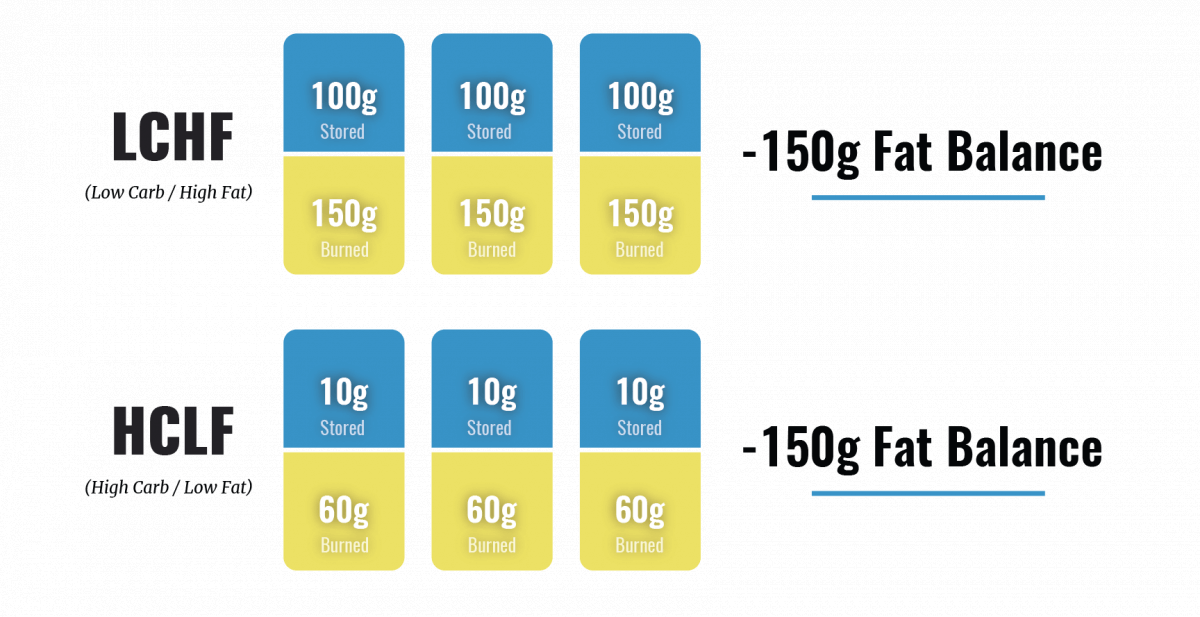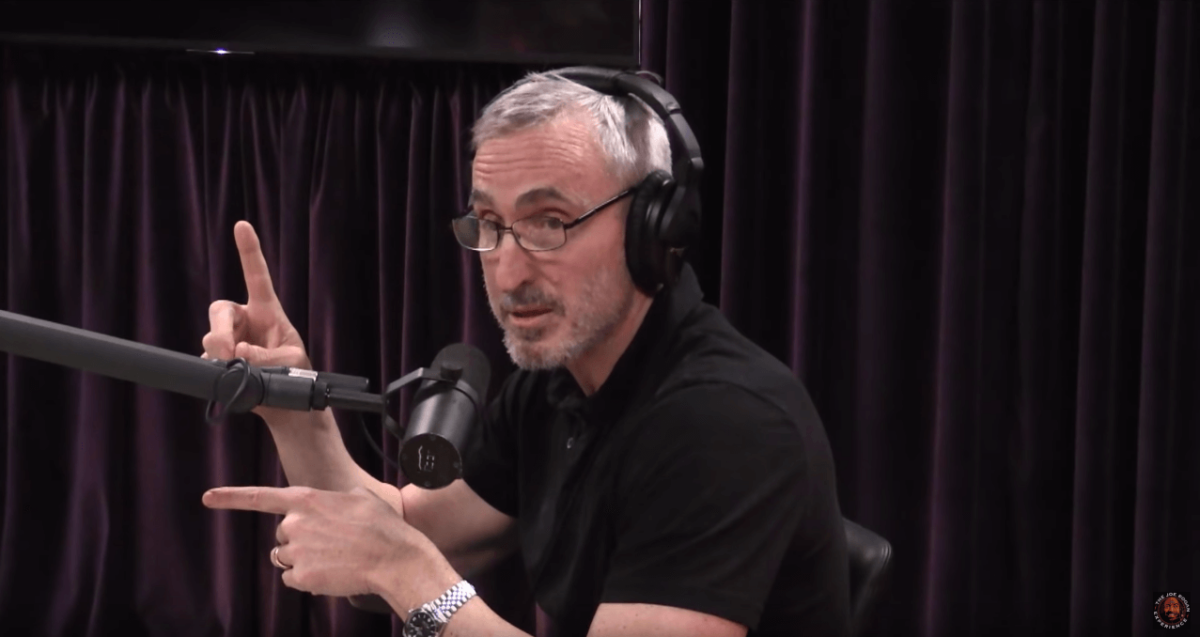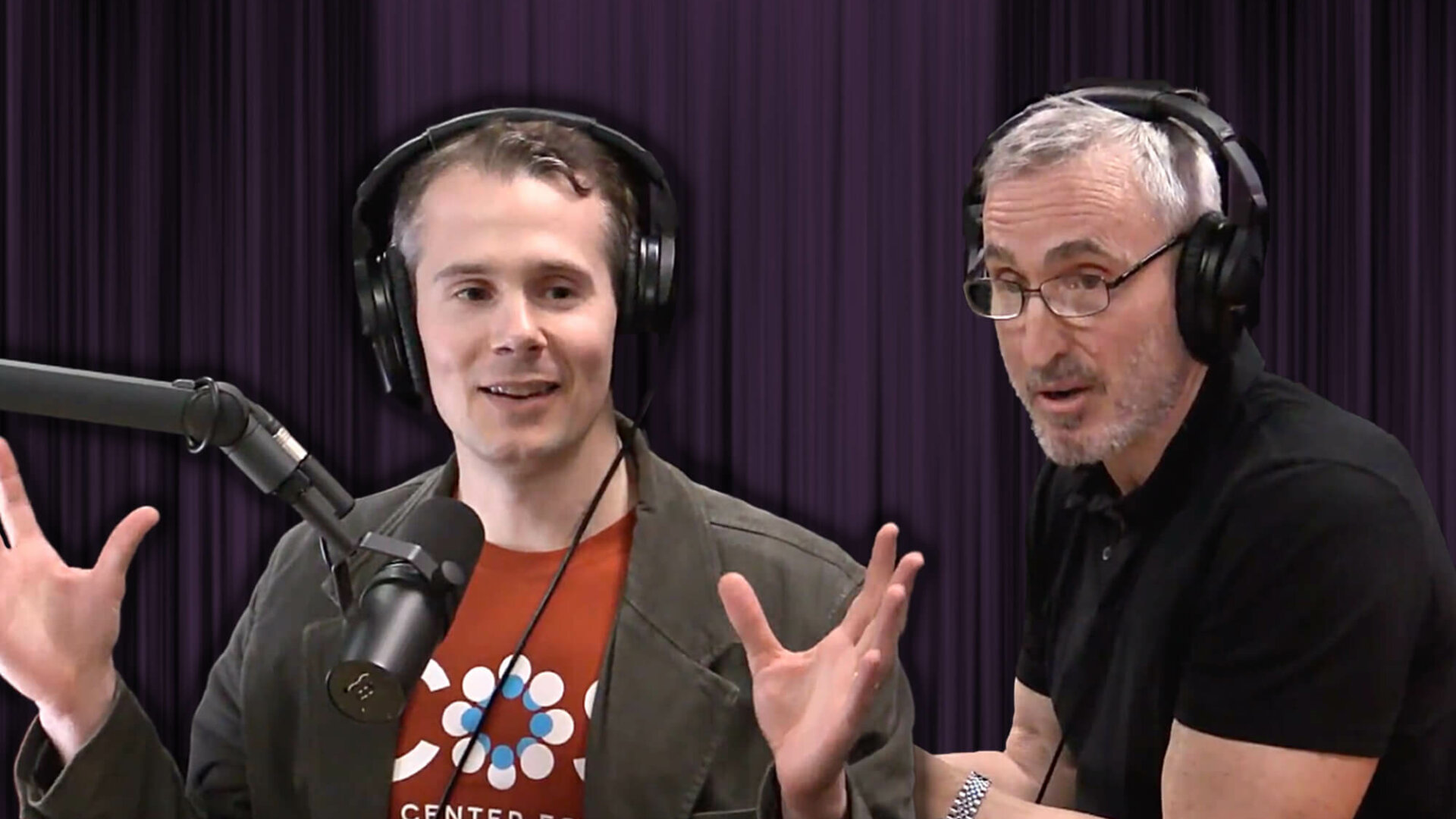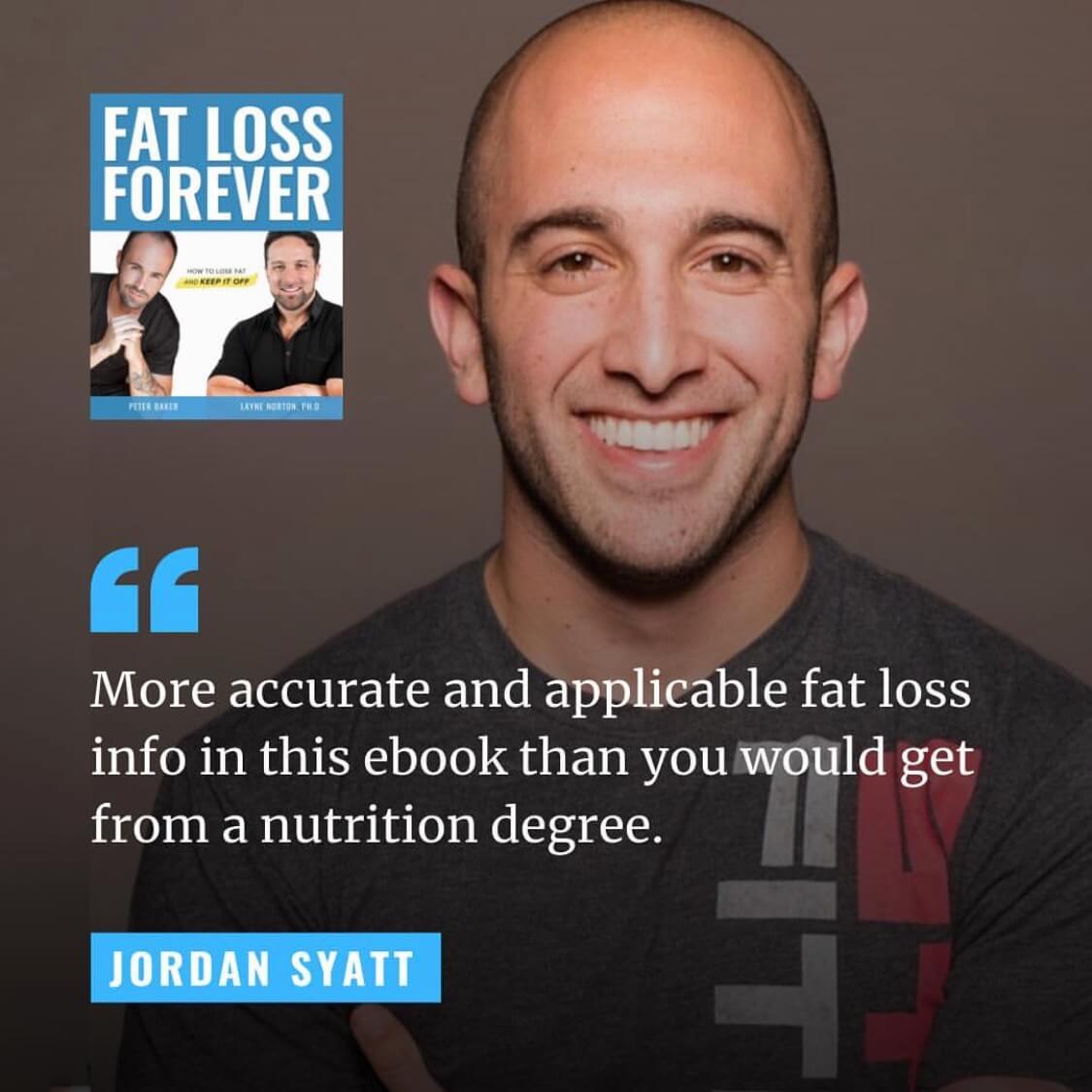I watched the Stephan Guyenet vs. Gary Taubes debate on Joe Rogan’s podcast with a lot of hope and anxiety. Dr. Guyenet is an incredibly intelligent researcher who has written some of the most insightful articles on obesity and fat loss I’ve ever read, but how would he do in a debate? Gary Taubes however, is a communicator by profession and I was extremely worried that he would be able to sidestep, or goalpost move, or story tell enough to get off the hook and continue to push his narrative. For these reasons, I’m not a Gary Taubes fan. I first came across Taubes in 2008 when my Ph.D. advisor, Dr. Donald Layman, had me read an article Taubes wrote on some of the corruption in nutrition research, why fat wasn’t as bad as we’d been led to believe, and why the “big grain” industry had really pushed a lot of “bad” research. Full disclosure, my Ph.D. was funded by the egg and dairy boards and my first introduction to Taubes was in a positive light as a science journalist who was an authority.
Even though Dr. Layman may have chosen a poor figure to introduce me to—in his defense, Taubes hadn’t yet gone full potato with his claims in 2008—Dr. Layman also taught me critical thinking. So, while I originally had a positive introduction to Taubes, over the next few years of reading various quotes and then some of the other articles he wrote, I quickly saw that he was not only biased, but he rarely told the whole story. I became even more skeptical of his claims as more data emerged comparing low carbohydrate diets to high carbohydrate diets showing no difference in fat loss when calories and protein were equated.
Later, in 2015 at the Ultimate Evidence Based Fitness Summit in the UK, Alan Aragon and Taubes were scheduled for to debate each other. I’ll admit, I was already a bit biased, but I wanted to see how Taubes would defend the evidence that I knew Alan would present. Gary spent most of the time telling stories, discrediting any research he didn’t like (without ever giving any specific reasons as to why the research was bad), and sprinkling logical fallacies throughout the debate.
Near the end, however, he dropped an absolute bombshell. Alan asked him what would happen if the studies his organization (NuSi) funded found evidence that contradicted his hypothesis (the Carbohydrate-Insulin Model of obesity that we will discuss more in depth later)? Would he change his mind based on overwhelming evidence? Gary shocked everyone by saying “No.” At that point, I walked out of the room. I didn’t need to hear any more. Anyone who is not willing to change their minds in the face of overwhelming data is not a scientist, but a politician.
You see, when you tie your entire identity to a diet or nutrition strategy, it becomes very hard to admit that you might have been wrong. I’ve been wrong on many things that I used to believe: meal frequency mattered more than it does, HIIT cardio was the next best thing since (low carb) bread, fasted cardio was greater than fed cardio, and a myriad of other topics. By being wrong, it allowed me to learn and grow. In fact, being wrong can be a beautiful thing because it means that we weren’t doing everything right and there is room for improvement.
Enter Joe Rogan, Stage Left
When Joe Rogan contacted me in August of 2018 regarding a podcast appearance, he asked who I wanted to debate. I immediately asked for Gary Taubes. To me, Taubes represented everything that was wrong with nutrition dogma. Unwilling to change his mind to accommodate new data, criticizing any study as “bad” that didn’t support what he believed, and slandering some scientific researchers, in my opinion. Unfortunately, that didn’t happen as I instead “debated” Dr. Dominic D’Agostino.
Dom and I are close friends and go back well over a decade. I knew Dom and I wouldn’t disagree on much but I also know it would be a great discussion and incredibly enlightening for the audience. Dom is a ketogenic diet researcher but he is not a dogmatic zealot and he acknowledges that the data shows that calories DO matter and that the ketogenic diet is not a cure-all. Not only that, but Dom also acknowledges it’s not superior for fat loss when calories and protein are equated.
The 3-hour podcast we had with Joe turned out better than I think any adversarial debate would have. It was more of an educational discussion with minimal disagreement.
Watch: Joe Rogan Experience #1176 – Dom D’Agostino & Layne Norton
About a month ago I found out Taubes would, in fact, be part of a debate on Rogan’s podcast against Dr. Stephan Guyenet, someone who I feel is extremely brilliant. I was extremely confident that Stephan would absolutely trounce Gary, but I was a bit concerned because I’d never heard Stephan debate and I knew Gary was a master of deflection, storytelling, and misdirection. I want to be clear in stating that I think Stephan did a pretty good job. He addressed all of Gary’s points saliently, but if I had any criticism it would be that I felt he got too honed in on trying to prove the brain is the master controller of obesity which made it easier for Gary to deflect.
I wish Stephan had completely honed in on dismantling the Carbohydrate-Insulin Model (CIM) of obesity which is what Gary believes in. I am confident that he would have been able to pin Gary into the corner, but instead, Gary deflected and was able to confuse many people enough that even Rogan explained by the end “I am not sure who to believe.” This is why I felt it was important for me to write this analysis and give my opinion because I want to clear up some of the confusion on the podcast. I also sent this analysis to Joe in the hopes that he reads it. I also felt it was very important that I acknowledge my bias against Taubes right away and upfront, which is what a good scientist should do. Regardless of that, I believe the data will speak for itself. I have included timestamps in the podcast where relevant for fact-checking purposes.

Almost immediately, the debate turned into a “does the brain regulate obesity or does something else regulate obesity.” In my opinion, this was a bit indulgent for both Gary and Stephan. There is evidence that the brain is a crucial regulator of food intake, but we cannot rule out the impact of the adipose tissue itself. Adipose tissue is an endocrine organ that “talks” to other tissues including the brain. It’s a bit of a chicken vs. egg argument, but I would say that data strongly points to Stephan being more accurate about this than Gary. I also think it’s a superfluous argument (my opinion) and muddies what I hoped the central core of the debate would be–the Carbohydrate-Insulin Model (CIM) of obesity.
The Insulin Fairy
The CIM is the model Taubes aligns closely with as well as Dr. David Ludwig who I believe originally proposed it. I will do my best to summarize quickly without going “into the weeds” as Rogan says. The central core of the CIM is that we don’t get fat from overeating. Rather, we overeat because we become fat. This theory postulates that we get fat because we consume carbohydrates which increase insulin production. Insulin inhibits lipolysis (breakdown of stored fat) by inhibiting hormone-sensitive lipase (HSL) and stimulates uptake of fats into adipose tissue which “traps” them there, making us fat.
Their belief is that insulin, by way of inhibiting release of stored fat, causes the other tissues to sense an energy deficit (since the energy is “trapped” in adipose) and thus we overeat in order to provide fuel to the tissues that feel they are “starving.” As Guyenet points out on his website, “according to this model, high calorie intake and low calorie expenditure are the RESULT of expanding fat tissue, not its cause.”
This is in stark contrast to the energy balance model accepted by most nutrition scientists where fat accumulation is a result of an imbalance between energy intake and expenditure. Throughout the podcast, Stephan does a great job providing evidence to counter Taubes’ claims, however, I was a bit disappointed that he did not press him to state exactly what his beliefs are according to CIM. Instead, most of the podcast was spent nitpicking over specific studies rather than focussing on the CIM.
Throughout the podcast Gary deftly brushes off numerous studies that contradict the CIM and continuously moves the goalposts by saying that the studies were too short, or they weren’t done well, but he never provides an example of how they should have been done or what was wrong with them (other than funding source, though ironically, he didn’t criticize his own studies for funding source). Only choosing to criticize a funding source from a study while failing to detail why the study was “bad” and not being able to eloquently elaborate on how it could have been done better, is a hallmark of cognitive dissonance and zealotry that I talk about so much. A theory must be disprovable and testable. Fortunately, the CIM hypothesis is testable. What does that data regarding the CIM say so far?
If the CIM was accurate, then high carb diets should produce obesity (regardless of calories) and certainly would produce obesity vs. a low carb diet when calories were matched. Gary also states in the debate that exercise doesn’t really matter (see 1:42:10). If that was the case, where are all the fat marathon runners who eat high carb diets? Where are all the pro athletes gaining massive amounts of weight on high carb diets? According to the CIM, calories don’t matter, only carbs and insulin. Further, numerous studies have shown that high carb diets and high fat diets produce the same weight loss between high carb and low-fat diets when calories are the same and protein is the same (it’s important to equate protein since it increases energy expenditure). Perhaps the most precisely controlled study on this topic is here: [1]
In this study, subjects were fed a high carb diet for four weeks followed by a ketogenic diet for 4 weeks. All subjects were in a metabolic ward where every meal was prepared for them. If you wanted to do a long-term study, it would be very difficult to use this level of detail because you’d essentially be putting people in pseudo-jail for long periods of time. The difference in carbohydrate intake between the diets was extreme: the high carb low fat (HCLF) diet contained 300g of carbohydrates and 35g fat while the ketogenic diet contained 31g carbs and 80g of fat.
Both diets contained the same amount of protein. That’s 10x more carbohydrate intake in the high carb group and they also consumed 147g of sugar per day vs. just 10g sugar in the ketogenic diet group. This produced significant differences in insulin secretion (a difference of 21% in fasting insulin) but no difference in fat loss between the two diets. Gary will say the study was too short (goal post moving) but if the CIM was correct, you would expect to see SOME difference, but you don’t.
He would also likely point out that there was a small increase in energy expenditure on the ketogenic diet (that was near the detection limits of the equipment analyzing it). This difference in energy expenditure was transient during the first week of the ketogenic diet and didn’t last past that and didn’t produce meaningful differences in fat loss. This small increase in initial energy expenditure may likely be from the adaptation period of moving to use ketones & fats for fuels vs. carbohydrate. After that initial adaptation to ketones & fats, the small difference in energy expenditure disappears. In fact, it appears that when calories are equated, fat restriction may produce greater loss of body fat than carb restriction by a small amount. [2]
These data are in stark contrast the CIM. If carbohydrates and insulin alone produce obesity, how is it possible that people following a high carb diet lost just as much fat (possibly a little more) than those who ate a very low carb diet? For the naysayers who claim these studies were too short, it doesn’t offset the other ~30 studies examining calorie equated low carb vs. low fat diets which also show the same thing. [3] Also, an 18 month long term study found the same thing between high and low glycemic diets even though insulin secretion was different. [4]
Hopefully, you’re convinced that part of the CIM is not plausible (calories don’t matter only carbs), but we can also rebuke other aspects of it. The idea that insulin traps free fatty acids in cells making the other tissues feel like they are “starving” has also been demonstrated to be incorrect. If this was correct, we would expect to see depleted levels of free fatty acids in blood during fasting in insulin resistant people. But we don’t. Obese people release MORE fatty acids from adipose, not less. [5]
Now we have 2 central themes of the CIM with extremely strong evidence to the contrary. Let’s examine this notion that insulin is a magical fat storing hormone. Gary focuses on short term effects of insulin after a meal on fat storage (particularly around 2:09:35). Yes, insulin drives free fatty acids into cells, but assuming this is the cause of obesity takes a very simplistic view of adipose cell metabolism. Fat is constantly being stored into adipose and released from adipose. It is the net synthesis of fat minus the breakdown of fat in adipose that will determine fat balance and net fat loss or gain (I’m simplifying the model here but it’s accurate for our purposes).
Taubes doesn’t understand this because at 2:21:30 he says that the same reason we get fat is the same reason our fat cells gain fat (insulin). But he is assuming those fats that are transported to the adipose tissue are trapped there, but that’s not how fat metabolism works. Insulin’s actions inhibiting lipolysis and driving fat into adipose are short term and during the period between meals those fats can be mobilized for energy. It’s not as if Insulin stuffs these fats into adipose and traps them there for eternity. Again, the energy balance will determine the NET gain or loss of fat.
Don’t Worry, There’s More
Moving forward for our next examples, let’s assume we are always equating calories and protein between our test diets. If someone eats a high carb diet, then by default they are eating a low-fat diet. Yes, insulin will be higher post meal, which will drive the available fats into fat cells. But most of those fats come from dietary fat, not carbohydrate. Stephan referenced an overfeeding study that demonstrated almost 99% of stored fat is from dietary fat, NOT from carbohydrate. [6]
This means that on a low fat diet/high carb diet you don’t store much fat. You also don’t burn nearly as much fat because insulin is higher. On a high fat diet, you will burn much more fat because carbs and insulin are lower, but you will also store more fat because you’re eating more fat. What will determine how much NET is burned vs. stored is the energy balance (check out page 37-38 of my book Fat Loss Forever that I have attached, and the figure shown here as it will help explain more. Even better, grab a copy and read the entire thing).
- Fat Balance = Fat Stored – Fat Burned
- If Stored > Burned then you are in a net positive fat balance and are gaining body fat
- If Burned > Stored then you are in a net negative fat balance and are losing body fat
- If Stored = Burned then you are in net fat balance and are maintaining body fat

This figure from the book shows hypothetical fat balance when consuming 3 meals either low carb/high fat (LCHF) or high carb/low fat (HCLF). At each meal, the LCHF diet is burning far more fat, but is also storing more fat. The HCLF group is burning much less fat but also storing much less fat. The overall net balance for each group is -50g fat which equates to -150g fat balance over the course of 3 meals. This assumes of course that calories are equal between the two diets and that they are both in a negative energy balance. You see, you can dramatically increase fat burning by eating a high fat diet, but burning more fat isn’t the same thing as losing more body fat because it only accounts for one side of the fat balance equation. When both parts of the story are accounted for we can see why carbs vs. fats don’t really make a difference on overall body fat loss.
More to this end, if the CIM was valid, we would expect to see a large increase in fat deposition if calories remained the same and we significantly increased insulin, since calories aren’t what make us fat according to the CIM. However, the results of a trial with the drug Liraglutide absolutely put the nail in the coffin for this theory. Liraglutide (a GLP-1 mimetic) stimulates insulin release but it also reduces body weight and body fat and improves metabolic health. [7] This absolutely crushes the idea that insulin is the central player in the development of obesity and not energy balance.
Hold on though, I’m not done crushing the CIM. Remember that one of the core themes of the CIM is that insulin causes fat to be trapped in fat cells and thus we can’t burn it and it’s not accessible to the other tissues of the body so we end up overeating because the rest of our tissues are “starving.” This aspect of the CIM has also been tested (indirectly) using a drug called acipimox which inhibits release of fats from adipose tissue. Not only did the subjects taking the drug not get fatter but they also did not increase their caloric consumption relative to the placebo group. [8]
Based on these data, we must reject the idea that carbs and insulin are a central driver of obesity. I’m not saying insulin plays no role, but it doesn’t play a dominant role and it’s certainly not more important than energy balance. I WISH Stephan had focused on attacking the core of Gary’s beliefs rather than getting suckered into a tit for tat on who funded what study and what tribe eats what because I know that Stephan is aware of all this data because his site is the original place where I learned about much of it. [9]
Before I break down the rest of the debate, I want to discuss funding sources for scientific studies. If we are going to simply focus on funding sources as a reason why studies are “bad” we might as well just throw out all of them. I was funded by the egg and dairy council for my research but they never once interfered with my research and I have friends who were funded by companies like Kellogg and General Mills with similar experiences. I’m not saying nefarious things never happen, because they can, and they do. But if they do, typically that shows up in the research as the data won’t be reproducible if it’s bunk.
Now that my CIM takedown is out of the way, I will point out quickly a few specific points of contention on the show where I thought the point was missed or where Gary’s hypocrisy was missed.
A Time Stamped Analysis
14:07: There is some confusion where Stephan says you can’t replicate obesity caused by junk food with sugar alone, and I think that Joe thought he was being a bit hypocritical. What Stephan was trying to say is that junk food is not just sugar. It’s high sugar, high fat, and typically high salt which makes it super palatable. Think about the tastiest junk food: cakes, cookies, doughnuts, etc. They usually have just as many calories coming from fats as they do sugar. What Stephan was saying is the combination of high fats and high sugar is extremely fattening because it overrides our normal satiety sensors and we overconsume calories from these sources, whereas if you try to make people or rodents obese on sugar alone or fat alone, they don’t typically become obese because sugar in isolation and fat in isolation are not hyper-palatable. This is demonstrated in rodent and human studies that Stephan referenced where overfeeding fats or sugar produce equal weight gain (though in lab animals fat produces more weight gain than sugar).
34:18: Gary makes an inappropriate reference to building muscle where he states that he doesn’t think the brain is causing you to eat more to build muscle and that it’s all “below the neck.” First, fat and muscle are two very different tissues, you can’t assume what regulates growth in one regulates growth in the other. Second, there is data showing that as you increase activity levels (from lightly active to heavily active) you will increase energy intake proportionately through regulation of satiety signals in the brain. [10] Ironically, sedentary people actually eat more than lightly active people because they have less sensitivity to satiety signals due to inactivity. So even if Gary’s comparison between muscle and fat tissues was valid (it’s not) it still doesn’t hold true that the brain isn’t involved in regulating energy intake due to exercise.

45:41: Here Taubes drastically misrepresents leptin. He says, “It can tell other cells that there is fuel available and you can burn that fuel, or it can tell other cells there isn’t fuel available.” That is somewhat true, however what he cannot reconcile with evidence is it is the opposite relationship to what it should be based on in the CIM. In the CIM theory, increased insulin decreases energy expenditure and “traps” fat in fat cells as we discussed previously. Insulin does increase leptin secretion [11], but leptin INCREASES energy expenditure and signals a “fed state” i.e. fuel is “available” which is in opposition to the idea that insulin “traps” fat. So Taubes is half right, but the other half of the story is in opposition to the CIM model. Again, he doesn’t discuss that, because it is not reconcilable with the data.
47:21: Taubes claims the Pima Indians support his model because the babies are malnourished while the mothers are fat and makes an emotional appeal of “how could a mother become fat while the baby is malnourished?” As Joe and Stephan pointed out, disease plays a major role here, but Gary’s story relies on the adults telling the researchers that they were eating very little food. We know from research people underreport caloric intake by around ~50% [12] and that food recall data is very unreliable. Gary holds this up as great data while later in the debate he also blasts food recall data in a study cited by Stephan, so there is another example of hypocrisy. And I wish Stephan would have called him on it. He also originally says that they (Pima Indians) were enduring a long famine when they became fat but later says they became fat when they moved onto a reservation and had access to sugar, flour, and lard (approx. 48:45). So, they became fat when they had access sugar and fat, i.e. modern, westernized, highly palatable foods, so they did not get fat just eating sugar during a famine, they became fat when they began overeating on calories once they were moved onto the reservation (and likely less active on the reservation as well).
1:08:00: Taubes goes on a rant about James Hill and JC Peters to discredit their overfeeding study which demonstrated that people get equally fat by overfeeding fat or carbohydrate when calories were equated. He claims Hill was an Olestra “shill” and everything he did was to try to show that dietary fat makes causes us to get fat. If that’s the case, then how can Taubes explain why their study showed people got equally fat on carbs and fat? If they were unethical shills, wouldn’t he have demonstrated that fat made people fatter?
1:10:10: Taubes says fat gain over the course of a few decades is the equivalent of 10-20 extra calories per day which he says doesn’t make sense and attempts to use this strawman to invalidate energy balance. There are two things he fails to account for here, the most obvious is that people do not linearly gain weight over time. In fact, they tend to gain it in surges, usually around the holidays or stressful events in their lives and then they do not tend to lose it. Thus, putting on 5 lbs. over a month during the holidays and not ever getting it off is NOT the equivalent of 10 calories per day, it’s more like ~600 per day during that time frame and then maintaining weight for most the rest of the year. There is evidence that this is how weight gain occurs for many people. Even if it’s only a pound as reported here [13] that is still an extra ~125 kcals per day, not 10. Taubes also fails to acknowledge that metabolic rate and caloric intake are not independent variables. As you eat more food and gain more weight, you expend more energy, so an initial 100 calorie surplus for instance, eventually becomes maintenance calories over time. To gain more weight, you must then increase your intake even more. This is the same reason weight loss on a diet is typically not linear. You decrease calories and lose some weight, but eventually your metabolic rate slows down and weight loss also slows. That doesn’t invalidate energy balance, it just means your metabolic rate changes based on how many calories you consume. Taubes does not acknowledge either of these points, either because he doesn’t understand them or because it would be difficult to reconcile with the story he’s attempting to tell.
1:18:22: Taubes says that the threshold for insulin causing fat gain is low when he is criticizing the overfeeding study by Hill and Peters stating that the subjects were already consuming enough carbs to get fat so adding fat or carbs on top of that wouldn’t make a difference. Later, he criticizes the study referenced by Stephan on tribes who consume high sugar but don’t get fat by reading an email he wrote to Stephan (1:44:00) stating that their consumption equated to around 270g of sugar intake per week (not counting the sugar cane because they didn’t know how to assess it). So apparently now he believes the threshold for carbohydrates is not low since over 270g per week of sugar is not enough to worry about? He also criticizes the Christopher Garter where they told free living subjects to eat a high carb/low fat or low carb/high fat diet (approx double the carbs in the high carb diet) at 2:01:33 saying that they told both the high and low carb groups to limit sugar. This is an enormous hypocrisy that was not pointed out. If the threshold for carbs causing fat gain is low as Gary claims, then it SHOULDN’T MATTER if they told both groups to limit sugar when one group is still consuming a far greater amount of total carbohydrate than the other group because the insulin levels would still be significantly higher in the high carb group. Taubes tries to deflect studies that disprove his hypothesis by constantly moving the goalposts. First the threshold for insulin causing fat gain is low, and that’s why the first study didn’t matter, but then later the threshold must be high because the high carb diet group limited sugar? I was actually screaming at my computer screen at this point and wish Stephan would have called him on this.
Additionally, Rogan pointed out at 2:05:41 that since both diets were low in sugar it makes sense they would lose fat, but this assumes that sugar is more fattening calorie per calorie than non-sugar carbohydrate which is not supported by data. Take this extremely tightly controlled study where both groups lost the same weight even though one group ate over 100g of sugar per day while the other group at about 10g of sugar per day. [14] This was a 6 week tightly controlled study but other long term studies in free living individuals like the CARMEN study have demonstrated the same thing: sugar does not cause significantly less fat loss or more fat gain when calories are equated between diets. [15]
1:41:05: Rogan astutely points out that these hunter gatherers who remain lean eating high sugar have high energy demands. Rogan says that he thinks what Gary Is trying to say (since he has moved the goal posts the entire debate) is that with our modern civilization and how sedentary we are, that adding sugar is enough to make us fat but that’s not the case for hunter gatherers or athletes who have high energy demands… but that is exactly what Gary is trying to say. As Gary himself states, he does not believe exercise contributes much to fighting obesity and as he has said many times, he believes carbohydrates are the sole reason we get fat.
Overall, I didn’t think the debate was as bad as some people were saying. I also don’t want people to think that I’m taking a shot at Dr. Guyenet. I have the benefit of Monday morning quarterbacking this debate with the benefit of hindsight. It’s insanely difficult to keep track of contradictions in a debate when you are focusing on addressing claims by the other party. I thought Stephan did a great job addressing the claims that Gary made with actual evidence. I just wish he would have went on the offensive a bit more, but again, I have the benefit of hindsight. Taubes did exactly what I thought he would do in the debate—tell stories, side-step, and move the goalposts. As Gary has already stated, there is no amount of evidence that could ever be presented to him that would make him change his mind. To be fair, he isn’t alone. There are low carb zealots, vegan zealots, fasting zealots, and all forms of other nutritional zealots out there who have allowed their preferred nutrition practice to replace religion. I do not expect anything I or anyone else does will change the minds of these zealots. My hope is that this article is able to reach those people who find themselves in the middle where they aren’t sure who to believe, much like Rogan said at the end of the interview. As I close this article, please keep in mind these two quotes:
“That which can be asserted without evidence, can be dismissed without evidence.”
~Christopher Hitchens
“If someone doesn’t value evidence, what evidence are you going to provide that proves they should value evidence?
~Sam Harris
References
- Hall, K. D. et. al (2016, July 06). Energy expenditure and body composition changes after an isocaloric ketogenic diet in overweight and obese men. Retrieved from https://academic.oup.com/ajcn/article/104/2/324/4564649
- Hall, K., Bemis, T., Brychta, R., Chen, K., Courville, A., Crayner, E., . . . Yannai, L. (2015). Calorie for Calorie, Dietary Fat Restriction Results in More Body Fat Loss than Carbohydrate Restriction in People with Obesity. Cell Metabolism,22(3), 427-436. doi:10.1016/j.cmet.2015.07.021
- Hall, K. D., & Guo, J. (2017, May). Obesity Energetics: Body Weight Regulation and the Effects of Diet Composition. Retrieved from https://www.ncbi.nlm.nih.gov/pubmed/28193517
- Sichieri, R., Moura, A. S., Genelhu, V., Hu, F., & Willett, W. C. (2007, September). An 18-mo randomized trial of a low-glycemic-index diet and weight change in Brazilian women. Retrieved from https://www.ncbi.nlm.nih.gov/pubmed/17823436
- Mittendorfer, B., Magkos, F., Fabbrini, E., Mohammed, B. S., & Klein, S. (2009, October). Relationship between body fat mass and free fatty acid kinetics in men and women. Retrieved from https://www.ncbi.nlm.nih.gov/pmc/articles/PMC3319738/
- McDevitt, R. M., Bott, S. J., Harding, M., Coward, W. A., Buck, L. J., & Prentice, A. M. (2001, December 01). De novo lipogenesis during controlled overfeeding with sucrose or glucose in lean and obese women. Retrieved from https://academic.oup.com/ajcn/article/74/6/737/4737416
- Pi-Sunyer, X., Astrup, A., Fujioka, K., Greenway, F., Halpern, A, et. al. (2015, July 02). A Randomized, Controlled Trial of 3.0 mg of Liraglutide in Weight Management. Retrieved from https://www.ncbi.nlm.nih.gov/pubmed/26132939
- Makimura, H., Stanley, T. L, et. al. (2016, March). Metabolic Effects of Long-Term Reduction in Free Fatty Acids With Acipimox in Obesity: A Randomized Trial. Retrieved from https://www.ncbi.nlm.nih.gov/pubmed/26691888
- Guyenet, S. (2018, January 05). Home. Retrieved from http://www.stephanguyenet.com/interesting-new-genetic-study-on-insulin-secretion-and-body-mass/ Stephan does a great job of dissecting not only the study but how it’s done, and if you are interested you can look at the study proper via this link.
- Mayer, J., Roy, P., & Mitra, K. P. (1956). Relation between Caloric Intake, Body Weight, and Physical Work. The American Journal of Clinical Nutrition,4(2), 169-175. doi:10.1093/ajcn/4.2.169
- Malmström, R et. al. (1996, August). Insulin increases plasma leptin concentrations in normal subjects and patients with NIDDM. Retrieved from https://www.ncbi.nlm.nih.gov/pubmed/8858224
- Lichtman, S. W et. al. (1992, December 31). Discrepancy between self-reported and actual caloric intake and exercise in obese subjects. Retrieved from https://www.ncbi.nlm.nih.gov/pubmed/1454084
- Parker-Pope, T. (2007, November 22). The Skinny on Holiday Weight Gain. Retrieved from https://well.blogs.nytimes.com/2007/11/22/the-skinny-on-holiday-weight-gain/
- Surwit, R. S., Feinglos, M. N., McCaskill, C. C., Clay, S. L., Babyak, M. A., Brownlow, B. S., . . . Lin, P. H. (1997, April). Metabolic and behavioral effects of a high-sucrose diet during weight loss. Retrieved from https://www.ncbi.nlm.nih.gov/pubmed/9094871
- Saris, W. H et. al. (2000, October). Randomized controlled trial of changes in dietary carbohydrate/fat ratio and simple vs complex carbohydrates on body weight and blood lipids: The CARMEN study. The Carbohydrate Ratio Management in European National diets. Retrieved from https://www.ncbi.nlm.nih.gov/pubmed/11093293





